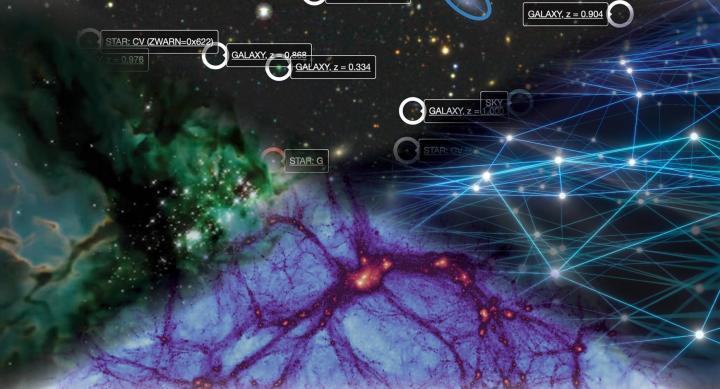
The University of Texas at Austin has been chosen to lead a new institute that harnesses artificial intelligence to explore some of the leading mysteries of the universe, including dark matter and the fundamentals related to the search for life. Housed in UT’s Oden Institute for Computational Engineering and Sciences, the NSF-Simons AI Institute for Cosmic Origins will be funded by the National Science Foundation (NSF) and the Simons Foundation. Its mission is to develop AI technologies for astronomical research to advance our understanding of the cosmos and accelerate the pace of new scientific discoveries.
“This is an exciting opportunity to advance our understanding and help answer some of the most fundamental questions about the universe. As part of our campus, NSF-Simons CosmicAI will drive discovery using AI, enabled by an incredible set of talented people and the largest GPU cluster in all of academia. And, through the Oden Institute, it will collaborate with eight scientific domains that are among the best in the country,” said UT President Jay Hartzell. “As astronomical data tend to be public and non-proprietary, CosmicAI aligns with our University’s mission to use open AI as an enabler for the public good. We are grateful for our partnership with NSF and the Simons Foundation to launch this institute.”
CosmicAI, which further advances UT’s “Year of AI” initiative, will unite an interdisciplinary group of faculty and researchers under one umbrella to expand AI innovation in astronomy. It will span eight departments with more than 17 faculty in the areas of astronomy, computer science, statistics and data science, linguistics, information sciences, math, mechanical engineering and aerospace engineering.
By building next-generation AI tools, the institute will accelerate discoveries related to the most basic human question: ‘Where do we come from?’
— Stella Offner, director, NSF-Simons AI Institute for Cosmic Origins
“By building next-generation AI tools, the institute will accelerate discoveries related to the most basic human question: ‘Where do we come from?’ The CosmicAI research will investigate the origins of the universe including the formation of galaxies, stars, planets and even the building blocks for life,” said Stella Offner, director of the new institute. Offner is an associate professor of astronomy in the College of Natural Sciences and co-director of the Center for Scientific Machine Learning at the Oden Institute.
CosmicAI will develop AI approaches to efficiently process large astronomical datasets, explore the nature of dark matter and model prebiotic molecules that are key to life in the universe. The institute also plans to democratize access to astronomical data by developing a powerful AI-based astronomy “copilot” to streamline the scientific method in astrophysics and assist researchers with visualizing data, producing statistical analyses, understanding the scientific literature and more.
“The Oden Institute's Center for Scientific Machine Learning was conceived in 2019 as a way to bring together researchers at the interfaces of machine learning and domain sciences. We are thrilled to provide an interdisciplinary home for CosmicAI. It has been particularly exciting to see cross-campus collisions taking place and laying foundations for this exciting new effort,” said Karen Willcox, director of the Oden Institute.
With a goal to make AI training and methods accessible to all, the grant includes extensive education and outreach components to help train the AI-literate workforce of tomorrow. From multi-tiered programs to engage high school students with astronomy data, to research training for undergraduates, to graduate-level courses offered through an AI-astronomy certificate-type program, CosmicAI will build opportunities through reducing barriers, lowering costs and expanding online opportunities.
Additionally, CosmicAI will leverage the resources of the Texas Advanced Computing Center to launch a data platform that hosts large astronomical datasets within an AI-enabled analysis. The data platform will serve as a nexus for community calculations and collaboration.
The new institute will be co-directed by Matthew Lease, professor in UT’s School of Information and an expert in AI modeling and human-computer interaction. “NSF AI Institutes represent a cornerstone federal government commitment to supporting long-term, fundamental AI research. By focusing AI research on key scientific domains — in our case, the Astronomical Sciences — AI Institutes harness domain challenges to drive new, fundamental advances in AI capabilities, which in turn enable new advances in each scientific domain,” said Lease. “I am particularly excited by our AI Institute's focus on developing new, generative AI capabilities to accelerate scientific discovery.” Lease is a faculty founder and leader of the University’s Good Systems initiative, a multi-year campuswide grand challenge to develop ethical AI technologies.
“It is exciting to witness AI transforming the scientific discovery pipeline, which will accelerate progress at an unprecedented pace, unlocking innovations that promise to transform our understanding of the universe, “ said Arya Farahi, a research group lead for CosmicAI and assistant professor in the Department of Statistics and Data Sciences at UT.
The new National Artificial Intelligence Research Institute for astronomical sciences is part of the NSF-led National Artificial Intelligence Research Institutes program, which now includes 27 AI institutes across the U.S., two of them led by UT: The AI Institute for Foundations of Machine Learning (IMFL) and CosmicAI. The new institute will receive $20 million over five years: $10 million from NSF and $10 million from the Simons Foundation.
Institutional partners in NSF-Simons CosmicAI include the NSF National Optical-Infrared Astronomy Research Laboratory, the NSF National Radio Astronomy Observatory, the University of Virginia, the University of Utah and the University of California, Los Angeles. These institutions will be joined by private collaborators, including the nonprofit Allen Institute for Artificial Intelligence, who drives open source Generative AI efforts in the scientific domain through their foundation model OLMo.
View the NSF press release here.
Learn more at cosmicai.oden.utexas.edu.
For more information, contact: Joanne Foote, Oden Institute for Computational Sciences and Engineering, jfoote@oden.utexas.edu.

